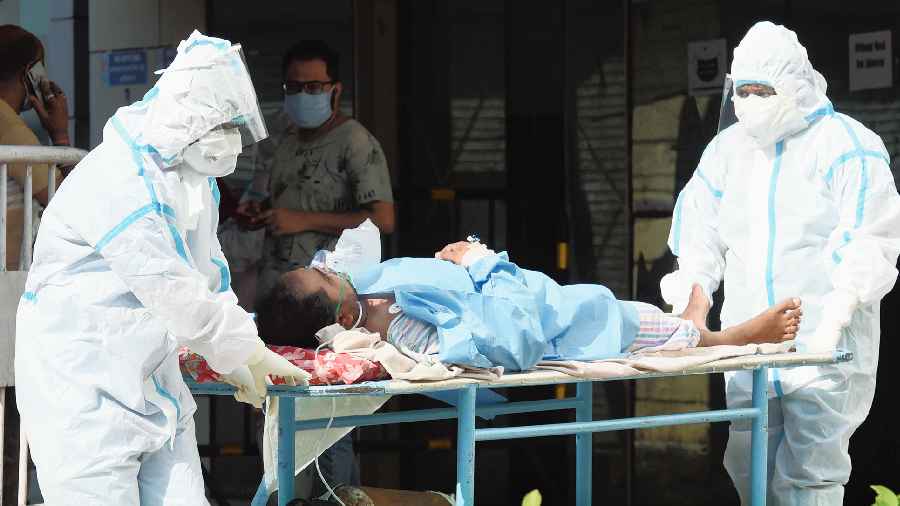In the past two decades, the corporate hospitals of Kolkata have gradually settled down to a style of functioning that has significantly influenced patients, doctors and society.
There is of course no doubt at all that they have made a major contribution to the medical practice of Bengal. There has also been a change in the patients’ attitude during this period.
The understanding and interpretation of various intricate medical issues may have been different by the hospital administration, doctors and patients. During this period, evidence-based medical options have effectively evolved and transparency with adequate documentation has further improved. There has also been an increase in the accountability for doctors as well as hospitals.
Smaller medical establishments have found it difficult to sustain and this has given way to the much larger corporate hospitals, which the patients have welcomed. With the increase in professionalism and consumer-based issues, personal relationships have suffered.
The number of family physicians in various localities has dwindled with hardly anybody to visit homes for treatment.
Today it may be difficult to find a doctor and personality like Agnishwar, as acted by superstar Uttam Kumar in 1975.
Although there may still be some with the same intention but the circumstances have changed drastically over time. There was no Consumer Act during that time and hardly any questions were raised.
In Kolkata, corporate hospitals have brought about a significant change which certainly merits a discussion.
Covid
The last two years of Covid were unique and a lot of calculations regarding health-care went wrong. Many are of course lucky to survive this hostile period.
According to certain reports, the average life expectancy has increased by almost seven years in the past two decades. However, during Covid, it has reduced by two years.
This period witnessed an acute shortage of beds and ventilators. Some of the corporates benefited from this situation, and the non-Covid patients suffered badly. Also, the morale of the doctors and healthcare personnel suffered badly and even burnouts were reported.
Personal risk had to be taken to provide adequate care to the patients.
With travel restrictions lifted and a decrease in Covid infections, the corporate hospitals expected a huge rush of patients from neighbouring states and countries, but that did not happen. The present probably represents the actual situation. Covid has changed the entire situation in corporate hospitals:
• Outstation patients have probably understood that similar treatment and outcomes are possible locally if they visit the right team. Logistic advantages are available locally.
• People have become more health conscious during this period.
• Work from home (WFH) is possible in many professions but not in medical practice. Hospital and patients are necessary.
• Tele-health consultations have increased from 11 per cent in 2019 to around 76 per cent at present, according to a report.
• Online visibility in social media has been useful for the corporate hospitals during this period.
Reality
Government hospitals are welfare institutions where treatment is free but corporate hospitals are essentially business initiatives. The policies in corporate hospitals have changed significantly in the past two decades:
• Salaried doctors have been employed, guided by corporate rules like many other professions. Many are limited to the hospitals, hardly known outside.
• Team work is encouraged to provide better services than an individual.
• Advertising and marketing are done to get the maximum number of patients which the individual doctors are not permitted by the state medical councils.
• Corporate outdoors have largely replaced the standalone doctor chambers in the locality where the individual doctor enjoyed more freedom.
• Patients have choices within the hospital, other corporate hospitals or outstation treatment. Choice is personal.
• Contactability beyond office hours is with the hospital emergency, specialists are usually not available except in emergency situations.
Although the institution provides the infrastructure, it is the medical team which provides the expertise. Both are absolutely essential to treat the patient adequately.
Peaceful co-existence should prevail though it is not always the case. Individuals do become brands and also make institutions a brand on many occasions.
The exact working hours of doctors is unclear which needs to be adequately settled. The issue of social security, hardly required two decades back, needs to be handled sensitively today.
Situations may force a doctor to defensive medical practice today which may be detrimental to society.
For a paying patient, too, many corporate choices along the bypass may be confusing. Various schemes are also available which patients can avail depending on the local administration.
During the IPL, it was alleged and questions raised whether a non-cricketer
CEO can be involved in team selection where quality players are already present. Nobody, however, enquires whether a non-medical administrator can advise a salaried doctor on medical issues
related with the patients’ treatment.
The struggle between money, infrastructure and expertise continues, but which is more important? Although this may merit a discussion it is just beyond the scope of this presentation.
Change is constant, it needs to be appreciated.
Finally, it is your choice, your decision.
Gautam Mukhopadhyay is the secretary of the Bengal Oncology Foundation and clinical director of the department of surgical oncology, Peerless Hospital
